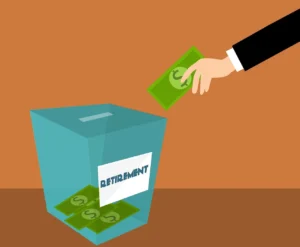COO and Director, Financial Planning

Spring is around the corner, and along with the warmer weather comes tax season. This month, we would like to highlight a few changes to be aware of and share some helpful tips for preparing your 2023 taxes.

Spring is around the corner, and along with the warmer weather comes tax season. This month, we would like to highlight a few changes to be aware of and share some helpful tips for preparing your 2023 taxes.
 We are very pleased to announce that Jenny Reimer, Director of Financial Planning at Money Coaches Canada, has taken on the additional role of Chief Operating Officer (COO).
We are very pleased to announce that Jenny Reimer, Director of Financial Planning at Money Coaches Canada, has taken on the additional role of Chief Operating Officer (COO).
Jenny has more than twenty years of experience in the financial services industry and holds the Chartered Investment Manager (CIM) and Certified Financial Planner (CFP) designations.
As our Director of Financial Planning for the past three years, Jenny has been responsible for managing ongoing training for our coaches. She keeps our team up to date on current trends, legislation, and best practices, ensuring our clients receive an exceptional financial planning experience.
In her expanded role as COO, Jenny will oversee all aspects of our daily operations, be a key member of our strategic planning team, and help guide the evolution of Money Coaches Canada as we look towards the future.
Jenny is an enthusiastic advocate for the advice-only financial planning model. We look forward to benefiting from her experience and leadership, and we’re thrilled that she has accepted this new challenge.
 Retirement, or financial independence, ranks as one of people’s top financial goals. We’re currently in the midst of “RRSP Season”, and many Canadians are giving at least a passing thought to their eventual retirement.
Retirement, or financial independence, ranks as one of people’s top financial goals. We’re currently in the midst of “RRSP Season”, and many Canadians are giving at least a passing thought to their eventual retirement.
A January 2024 survey by the National Institute on Ageing revealed that 26% of working Canadians aged 50+ say they are unsure of whether they can afford to retire at their desired time, with another 39% indicating they are not in the financial position to do so. The same survey found that the rising cost of living was by far the most frequently reported financial concern among Canadians 50+ in 2023, with the worry of running out of money in retirement coming in second.
In the face of so many immediate financial pressures, it’s easy to avoid thinking about the future and doing proper retirement planning. You may think you’re too young to be thinking about retirement or you’ve waited too long to plan for retirement, but it’s never too soon or too late to give yourself choices.
As a Money Coach based in West Vancouver, BC, everyday I help clients begin the journey of determining just how much they need to retire.
So where to start? Continue reading
The new year is a great time to reflect on the past and look forward to the future, both personally and financially.

Here are five tips for kicking off 2024 with a financial fresh start: Continue reading

Christmas can be like a runaway sleigh. You’re bundled up and warm, enjoying the dips and turns of holiday fun, when you realize that your budget bounced off the sleigh into a snowbank and you’re careening out of control into a ditch of debt. You wake up January 1st with an empty wallet and a massive holiday headache.
Heavy-handed metaphor? Maybe, but if you’re like many Canadians, I bet you can relate.
According to a new study from the Chartered Professionals Accountants of Canada (CPA Canada), Canadians are expected to spend an average of $645 on holiday gifts in 2023, a significant increase from the $589 spent in the previous holiday season. However 74 per cent of those surveyed expressed concerns that inflation would make holiday purchases more difficult and 30% said they may need to use debt to cover their expenditures.
But let’s not forget all the hidden expenses that often aren’t part of those predictions. Holiday clothes for everyone (often even the family dog), hostess gifts, office potlucks, more frequent take-out dinners (because there isn’t time to cook), school Christmas concerts, extra charitable donations (school food drives, point-of-sale requests for donations while shopping), baking supplies, and more money spent on gas as your bustle around town. Even hosting a holiday party for friends, in addition to Christmas and New Year’s celebrations, can quickly up-swing your December expenses significantly.
With Christmas just around the corner, I have some ideas and strategies that can help you stay in control of your holiday “sleigh ride.” Continue reading

Financial Literacy month is here again. You can tell by all the financial stories in our news feeds. Some warn you to watch out for hidden investment fees. Others explain the benefits of RRSPs and TFSAs. And what about that new First Home Savings Account? There’s always something to learn (or be reminded of) when it comes to managing our money.
Turning Plans into Action

Waiting for an inheritance is not a solid financial plan, but the fact is in the most recent available Survey of Financial Security (2019) Statistics Canada reported that the total net worth of Canadians 65 or older was about $3.67 trillion, and much of that legacy will be passed on. Those on the receiving end of a generous bequest can make a real impact on their financial well-being, but only if they make the right choices in the short and long term.
There are many ways to use a large inheritance, and we’ll look at several of them in this article. But, whenever you receive any kind of financial windfall, the first thing you need to do is catch your breath.
The gift of an inheritance is often bound to the sadness of loss. Allow yourself time to grieve. Don’t make important decisions for at least three or four months. Park the assets in a high interest savings account – which actually pay decent interest these days – until the emotional fog begins to lift. In fact, parking your money is good advice for any sudden financial windfall. The shock needs to normalize before you make decisions.
When you are ready to make some decisions, they should be made within the parameters of a comprehensive financial plan.
Here are some of the options to consider.

It has often been said that “Cash is King”, but when it comes to personal finance it wouldn’t be a stretch to say that it’s all about CASH FLOW.
Cash flow planning is a key aspect of financial planning that involves monitoring, analyzing, and managing the inflows and outflows of cash over a specific period. Effective cash flow planning is crucial for achieving financial stability, regardless of your age or income. It will help you manage your day-to-day finances, achieve your longer-term financial goals, and live a comfortable life free from money-related stress.
Let’s take a look at how cash flow planning plays a key role at various stages of life:
Continue reading
“You cannot escape the responsibility of tomorrow by evading it today.”
― Abraham Lincoln
 We live busy lives. We’re pulled in so many different directions, sometimes it’s a wonder how we manage to get anything done.
We live busy lives. We’re pulled in so many different directions, sometimes it’s a wonder how we manage to get anything done.
Thankfully, we humans are highly efficient, rational beings. We prioritize our important goals and diligently and consistently allocate our precious time to focus on only the most important activities to achieve those goals.
Right.
In truth, we know there are things we should have taken care of a long time ago, important tasks or projects that REALLY need to get done, yet somehow, they still sit on our mental To-Do list. And those are just the things we know we need to do… there’s probably a list of things we need to tackle that we aren’t yet aware of.
Instead, we spend our days focused on what seems to be urgent, rather than what’s truly important.
When it comes to our finances, the pull of the urgent is all too familiar. Managing endless bills, paying off debt, dealing with unexpected expenses, filing our taxes… there are a host of time sensitive activities that scream for our attention.
But what about those things that aren’t urgent, but are vitally important for our financial well-being? Continue reading